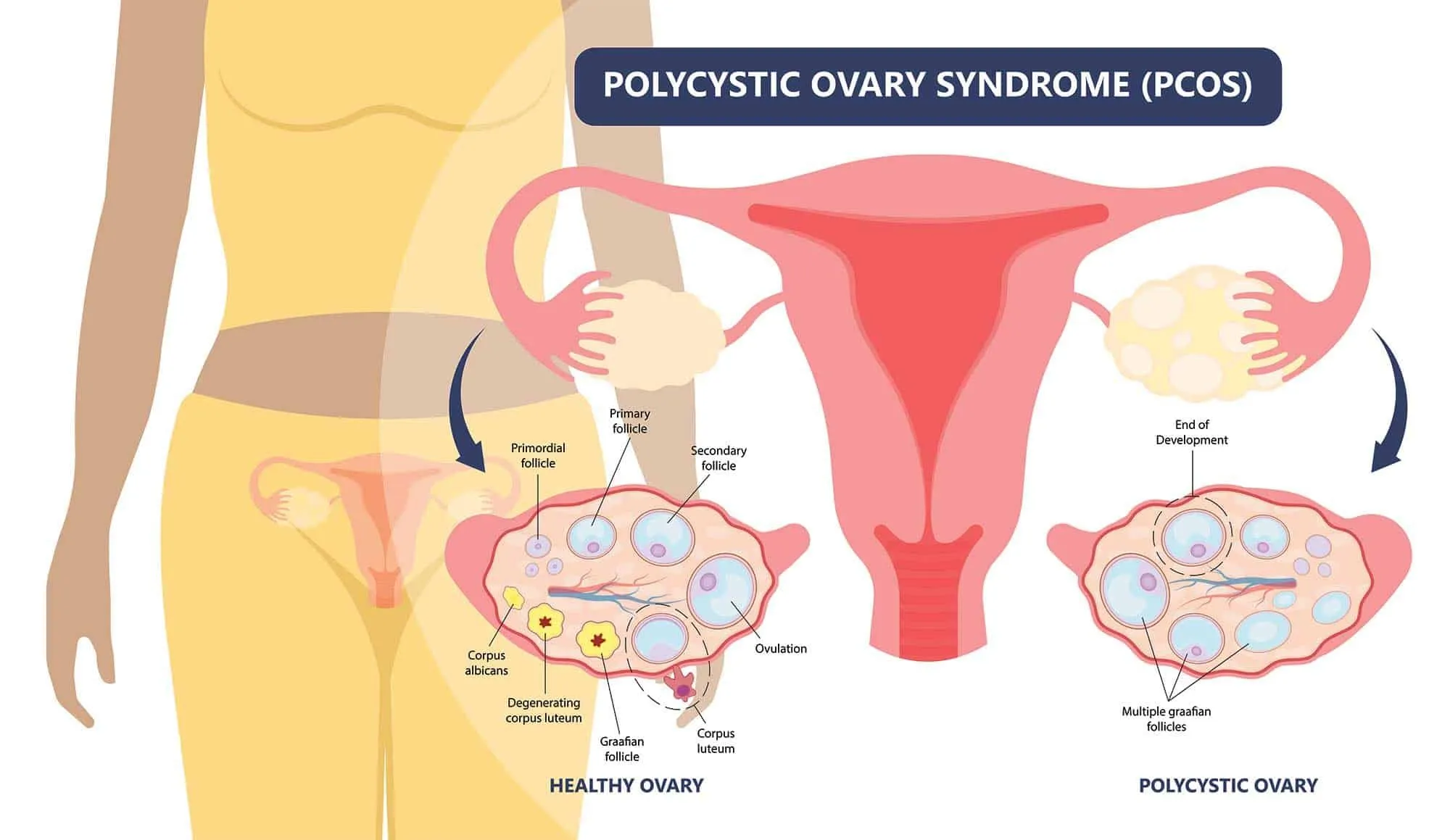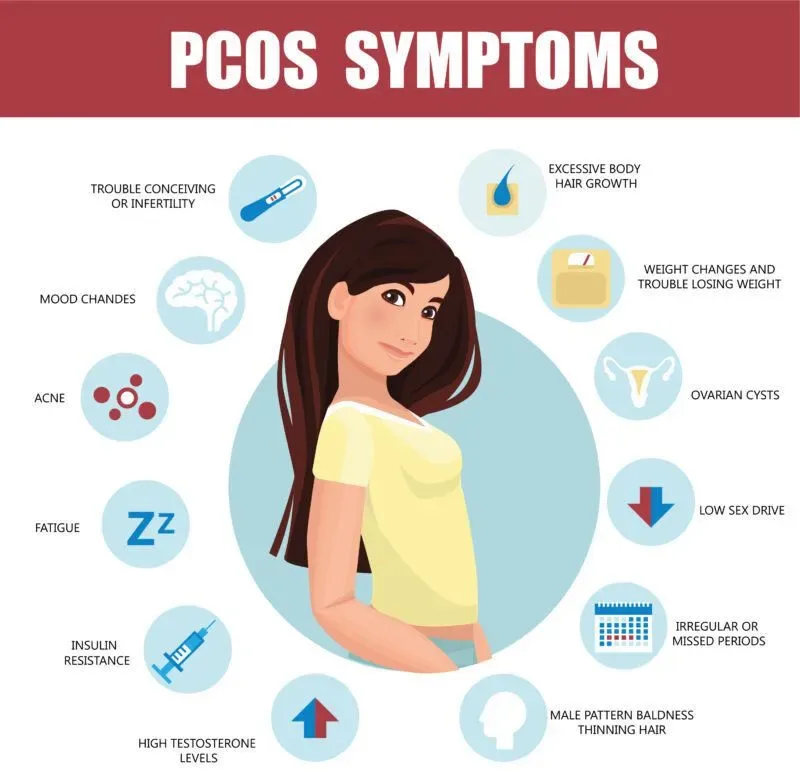PCOS affects a lot of women, and fertility is one of the most common issues that it causes. When you have PCOS and you are trying to get pregnant, it is extremely important for you to understand the fertility of your uterus. Unfortunately, not all women with PCOS can conceive through regular sexual intercourse. In this article we will tell you, Does Polycystic Ovary Syndrome (PCOS) Affect Conception?
Part of how your fertility is affected by PCOS depends on how severe you are with the condition. Understanding some medical facts about PCOS may help you achieve your desired pregnancy and maybe fulfill long-time fantasies about having a baby girl around.

Source: VectorStock
What Is Polycystic Ovary Syndrome (PCOS)?
Polycystic ovary syndrome (PCOS) is a condition in which the ovaries produce an excess of male hormones and fail to produce normal amounts of female hormones.
The ovaries are responsible for making eggs and releasing them from the body. During a woman’s menstrual cycle, these hormones cause the uterus to contract and release an egg. If a woman doesn’t have enough estrogen or progesterone, she may not menstruate at all.
PCOS is a hormonal disorder that can affect women of all ages. In fact, most women with PCOS are in their 20s and 30s. It is the most common endocrine disorder among women of childbearing age, and it affects 5 to 10 percent of all women.
Does Polycystic Ovary Syndrome (PCOS) Affect Conception?
Polycystic ovary syndrome (PCOS) is a common hormonal disorder that can affect fertility.
In PCOS, the ovaries have many small cysts, which are fluid-filled sacs that contain an egg. These sacs are made up of various hormones, including testosterone and estrogen.
The cysts cause irregular periods and may make it harder for a woman to conceive. The symptoms can be mild or severe, depending on how many cysts there are in your ovaries and whether they’re causing other health problems.

Source: VectorStock
PCOS is associated with an increased risk for miscarriage and lower birth weight babies. The exact cause of PCOS is unknown, but it seems to run in families and may be caused by a hormone imbalance.
Suppose you have PCOS and you are trying to get pregnant. In that case, it’s important to talk to your doctor about treatment options because some medications can make getting pregnant more difficult or impossible.
What Are The Symptoms Of PCOS?

Source: VectorStock
Most women with PCOS have symptoms before age 25. The symptoms may include:
- A large number of small cysts on the ovaries (polycystic ovary syndrome)
- Infertility
- Hirsutism, or excessive hairiness in your face, chest, back, upper arms, or legs (hirsute syndrome)
- Acne
- Oily skin
- Worrisome weight gain (excess weight in comparison to body size).
- Thinning scalp hair (alopecia)
- Difficulty losing weight after menopause.
- Irregular periods (not having a period every month).
How Do I Know If I Have PCOS?
The first step in diagnosing PCOS is to determine whether or not it’s an actual disease. This means trying to identify the symptoms that tend to occur with PCOS. For many women, the most common symptom is acne. Other symptoms include excessive hair growth and irregular periods.
You may have noticed that you have a lot of hair on your face. Some women even notice that their eyebrows are thicker than normal and that their eyelashes are darker than usual.
You may also notice that you have acne or oily skin or that you do not get your period or experience irregular cycles. You may wonder if this is the reason why you do not feel as confident as you did before.
A woman may have PCOS without experiencing any noticeable symptoms. In such cases, her doctor may use blood tests and ultrasound imaging to determine the cause of the under-the-skin swelling ( called hirsutism) and infertility.
If you have PCOS, it is important to talk to a doctor about it because there are different types of PCOS that require different treatments and medications.
Do I Need To See A Fertility Specialist If I Have PCOS?
Yes, you do need to see a fertility specialist if you have PCOS. A fertility specialist is a doctor who specializes in helping women get pregnant. They are trained to diagnose and treat infertility problems.
There are several types of infertility that can occur due to PCOS, and it is not just about ovulation issues. There can also be issues with the uterus, fallopian tubes, and cervix.

Source: VectorStock
A fertility specialist can help you understand what’s going on with your body and how to improve the chances of getting pregnant. They also can recommend medications that may help improve egg quality or increase your chances of ovulation, which is when an egg is released from one of your ovaries.
A fertility specialist can help you determine what type of fertility treatments will work best for you and your partner. They also can help with discussing any emotional issues surrounding infertility, such as grief or grief over the loss of previous pregnancies that have ended in miscarriage.
Your doctor should be able to refer you to a fertility specialist if needed. You will want to find one that specializes in helping women with PCOS who are trying to conceive or who have already conceived.
The reason why you need a fertility specialist is that they know how to treat these problems, and they are able to give you advice on how to improve your chances of having a baby naturally.
Is It Safe To Use Fertility Drugs With PCOS?
The short answer is yes. But it’s important to understand why.
To begin with, the treatment of PCOS requires more than just fertility drugs. The hormone imbalance and other symptoms of PCOS are often treated with medications like metformin, which help balance and regulate your body’s hormones. If you take these medications, the presence of ovulation may not prevent pregnancy from occurring, but it does make conception more likely.
However, fertility drugs can also be used to trigger ovulation in women who don’t have an established pattern of ovulation or who have been diagnosed with PCOS but who haven’t yet had a baby. This is because fertility drugs stimulate the release of eggs from the ovary (ovulation) — if you take them shortly before ovulation occurs, you can increase your chances of getting pregnant.

Source: VectorStock
One of the most common side effects of fertility drugs is a temporary increase in your risk of developing Ovarian Cysts. Ovarian Cysts are fluid-filled sacs that develop in the ovaries and have a few symptoms, including a change in your menstrual cycle and pain in your lower abdomen.
If you have PCOS, you may be at higher risk of developing ovarian cysts than someone who doesn’t have it. This is because clomiphene (Clomid) and Follistim (Gonal-F) can cause an increase in insulin resistance, which can lead to cysts forming in the ovaries.
The key word here is “shortly”: if you take fertility drugs for too long, they can actually cause harm to a developing fetus by causing premature birth or miscarriage. So it’s very important that you follow all the directions on your birth control pill — including taking it at exactly the same time every day — so that it doesn’t cause any side effects or harm to your body.
The decision to use fertility drugs should be made by the couple in conjunction with a doctor who specializes in fertility and assisted reproductive techniques.
How Is PCOS Treated?
PCOS is a complex condition that can be treated in several ways. The main treatment options include:
1. Lifestyle Changes
- The first step in treating PCOS involves making healthy lifestyle changes. These include:
- Eating a balanced diet with lots of carbohydrates and eating small meals throughout the day.
- Exercising regularly at least 30 minutes 3 times per week.
- Limiting caffeine intake, which can worsen insulin resistance and weight gain.
- Cutting back on alcohol (even if you don’t drink) may increase your risk for blood clots and heart problems.
2. Hormonal Therapy
The goal of hormonal therapy is to improve your ovulation, or the ability of your ovaries to release an egg each month. Hormone therapy may also help stop irregular bleeding and reduce acne.
3. Oral Contraceptives (Birth Control Pills)
Oral contraceptives are used to treat PCOS because they prevent ovulation by blocking hormones produced by the ovaries. In addition, progestin-only pills prevent pregnancy by preventing ovulation and thickening cervical mucus so sperm can’t reach an egg. This prevents fertilization from occurring. Oral contraceptives are a highly effective method of birth control for women with PCOS who want to avoid pregnancy but not eliminate their desire to have children. They’re also recommended to help alleviate symptoms like excess facial and body hair, acne, and painful periods.

Fertility, Maternity or Motherhood Concept. Happy Female Character with Positive Pregnancy Test. Cheerful Woman Holding Stick with Two Stripes. Family Planning, Cartoon People Vector Illustration
Source: VectorStock
4. Injections
Injections are a last-resort option for women who have had no success with other treatments. They can be used if you don’t respond well to other treatments or if you have certain side effects from them (like blood clots).
5. Metformin (Glucophage) And Other Oral Antidiabetic Drugs
Metformin is a prescription drug that has been used to treat type 2 diabetes since 1998 and is currently ranked as one of the best medications for this purpose. Metformin helps lower blood sugar levels by increasing insulin production in the pancreas while also reducing liver glucose output through its ability to decrease insulin resistance.
6. In Vitro Fertilization (IVF)
If you do not get pregnant after trying to conceive for a year or longer, then it may be time to consider other options like IVF (in vitro fertilization). IVF involves removing eggs from your ovaries and fertilizing them with sperm outside the body so they can develop into embryos outside your body. This process takes about two weeks and costs thousands of dollars each cycle.
Conclusion & Takeaway
Polycystic ovary syndrome (PCOS) is a hormonal disorder that is caused by abnormal hormone levels. The link between PCOS and pregnancy has long been recognized, and early studies found that women with PCOS had an increased risk for infertility. However, more recent studies have confirmed that PCOS does not affect pregnancy rates in women who are trying to get pregnant for the first time. While many women do experience fertility issues with PCOS, not everyone who has it will experience this.
There are a number of treatment options once PCOS is diagnosed. With the help of a qualified specialist, most women are able to conceive eventually and have normal, healthy pregnancies. Since not all treatments work for everyone (or even for most people), it’s important to follow your doctor’s advice when trying to conceive. Sometimes conception can take some time, but there are many positive and optimistic ways to conceive with PCOS.
If you want to consult a fertility specialist, you can contact us. We provide medical services related to polycystic ovary syndrome. We make sure to provide the best services to our patients to see them smiling through all their health problems. And of course, good luck!








